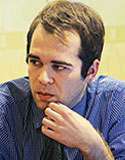By Leon Barzin, MMS Director of Health Information Technology
Mobile apps addressing opioid use disorder and medical education in neurology were the winning projects in the MMS Information Technology Award for medical students, residents, and fellows.

Jackson Steinkamp
MySafeRx, a multi-component technological platform designed to address opioid use disorders, was created by Jackson Steinkamp, a third-year student at Boston University School of Medicine. The app, intended for patients, integrates text messaging reminders, a secure electronic pill organizer, daily motivational recovery support, and a standardized protocol for supervised self-administration of naloxone. MySafeRx has demonstrated preliminary feasibility, usability, and acceptability. A larger randomized trial (n=70) comparing MySafeRx to standard care is underway.

Stephanie Rutledge, MD
NeuroCog is a searchable database of neurology physical examinations designed to prime medical students ahead of patient encounters, freeing up time for bedside discussions. It was created by Stephanie Rutledge, MD, a second-year resident at Massachusetts General Hospital. The app provides high-quality 30-second video demonstrations of neurology exams, featuring consenting patients, with accompanying text and voiceover. The content was reviewed by experts to ensure rigor and credibility.
For 17 years, the MMS Committee on Information Technology (CIT) has taken pride in hosting the annual Information Technology Award competition. The finalists made live presentations to the committee, followed by extensive Q&A sessions. The two winners each received a prize of $3,000.
Jackson Steinkamp, from South Dakota, graduated from Harvard School of Engineering and Applied Sciences with a BA in computer science in 2015. Stephanie Rutledge, from Dublin, Ireland, obtained her medical degree from University College Dublin in 2013 and moved to Boston in 2016.
The 2018 awards program will open for applications on September 1, 2018.
